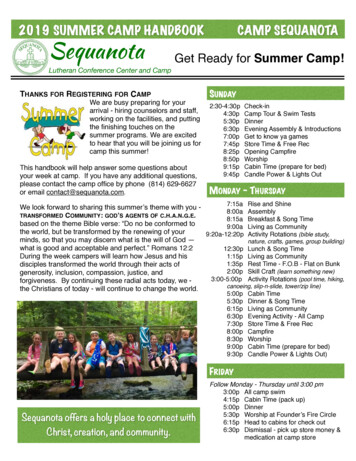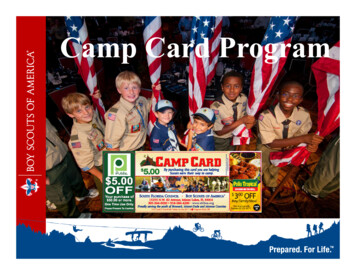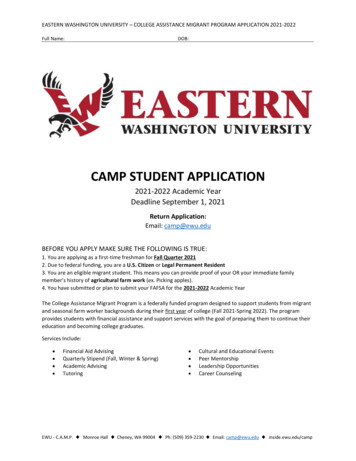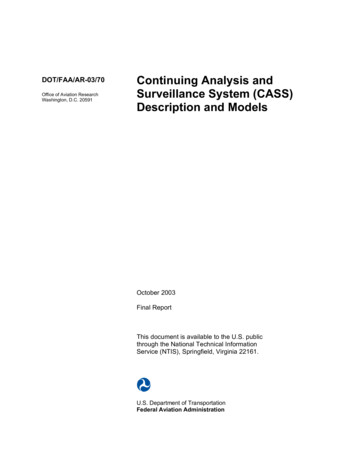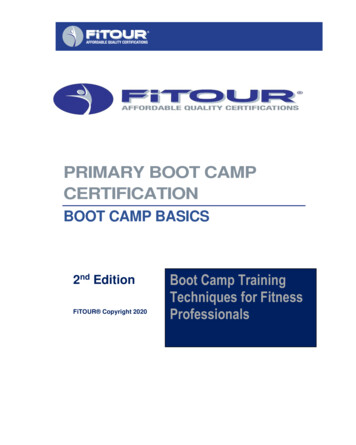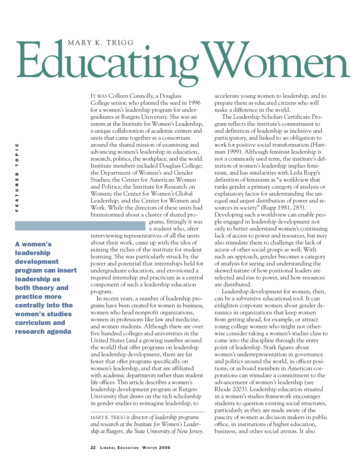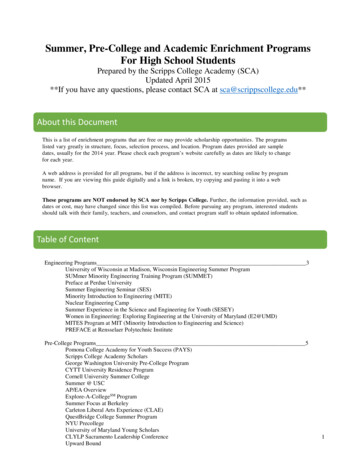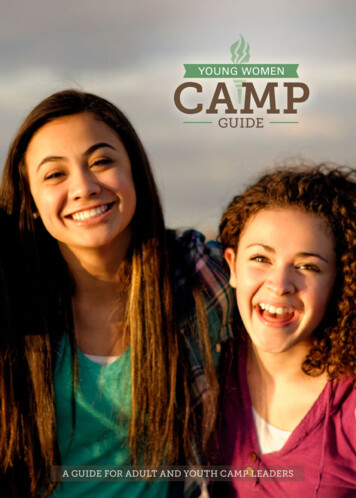
Transcription
CAMPYOUNG WOMENGUIDEA GUIDE FOR ADULT AND YOUTH CAMP LEADERS
CONTENTS1Introduction to Young Women Camp5Principles of Camp Leadership13 Prepare Spiritually Participate in Councils Minister to Others Teach the Gospel of Jesus ChristPlan Camp Choose a Camp Location and Date Determine Camp Goals Choose a Camp Theme Choose Activities Inform and Include Parents Plan for Safety and EmergencyPreparedness25Evaluate Camp30Ideas for Camp Activities
NEW ZEALAND
Introduction toYoung Women Camp“Yea, come unto Christ, and be perfected in him”(Moroni 10:32).“A fountain of pure water” and “a thicket of small trees”(Mosiah 18:5)—Mormon used these words to describe theplace where Alma hid after fleeing from King Noah. Thosetrees and that water became “beautiful . . . to the eyes” ofthe people who joined Alma there. Why? Because in thatplace, Alma and his people “came to the knowledge of theirRedeemer” (Mosiah 18:30).The location of your Young Women camp—whether it is ina forest, in a park, on a beach, or in a meetinghouse—canbecome beautiful to the eyes of all who gather there. Like Almaand his people, young women need a place where they cangather together, separate from worldly influences, feel the Spiritof the Lord, grow in unity and love, and strengthen their faithand testimonies of Heavenly Father and Jesus Christ.1
The Church encourages camp for young women. Under the direction of priesthood leaders and with consideration of the needsof families, ward and stake Young Women presidencies determinethe frequency and extent of the camp program. A multiday campis generally held each year on a ward or stake level. Other dayor overnight camps may be held at the discretion of priesthoodleaders to meet local needs and interests. The principles in thisbook should be applied in all planning.Camp is for all young women eligible to participate in theYoung Women program. Nonmembers who are willing to abideby Church standards may also be included. Leaders should determine which young women will be old enough by the date ofthe camp and invite them to participate. Parents and leaders maycounsel together on any exceptions to the age guideline with consideration of maturity and peer relationships. (See Handbook 2:Administering the Church [2010], 10.8.6.)Young Women presidencies, camp leaders, and youth campleaders should use the principles in this guide to plan and organize camp. These principles will help adult and youth campleaders plan a camp experience for the young women in eachChurch unit, regardless of location and circumstances. A campthat is planned and organized according to these inspired principles will help the young women grow in the gospel of JesusChrist, develop friendships, and increase in self-reliance andoutdoor skills.2
Alma and his people did not stay at the Waters of Mormon,but their experiences at the Waters of Mormon stayed with them.Likewise, as the young women return to their homes, their experiences at camp will stay with and strengthen them becausethey have come to a greater knowledge of their Redeemer.PHILIPPINESINDONESIAUSA3
Your spiritual preparation willguide your efforts as you planand prepare for camp.THAILAND
Principles of CampLeadership“Be thou humble; and the Lord thy God shall lead thee bythe hand, and give thee answer to thy prayers”(D&C 112:10).Youth and adults can become successful camp leaders asthey follow the leadership principles found in Handbook 2:Administering the Church: prepare spiritually, participate incouncils, minister to others, and teach the gospel of JesusChrist (see Handbook 2, 3.2 and the class presidency leadership lessons found at youngwomen.lds.org).Prepare SpirituallyAs a leader, you can receive inspiration as you pray, studythe scriptures, and fast while keeping the young women inmind. Consider attending the temple, where possible. Yourspiritual preparation will guide your efforts as you plan andprepare for camp.5
Participate in CouncilsYoung Women presidencies, adult camp leaders, and youthcamp leaders meet to counsel together about camp. Counselingtogether in this way invites inspiration from the Holy Ghost and willhelp you discover effective ways to meet the needs of the youngwomen and their families through camp. All those who participatein these councils should feel that their comments and ideas arevalued (see D&C 88:122 and Handbook 2, 3.3.2).Priesthood LeadersWard and stake priesthood leaders have the primary responsibility for the young women and need to approve all plans forcamp. Young Women presidencies should complete the Eventand Activity Plan and counsel with and receive guidance frompriesthood leaders about the purpose, goals, location, activitydetails, and schedule of camp. The priesthood leaders shouldalso approve the budget guidelines and the plans for camp safetyand security, which include selecting appropriate chaperones anddetermining camp standards for behavior and dress.Priesthood leaders can call women from the ward and staketo help plan and administer camp (if the camp includes youngwomen from only the ward, then adult leaders should be calledfrom that ward and not from the stake). They should also planfor a sufficient number of priesthood leaders to attend and visitcamp. Two or more Melchizedek Priesthood brethren need tobe present at all times during the camp to provide support and6
protection (see Handbook 2, 13.6.12). For overnight activities,these priesthood leaders should stay in facilities that are separatefrom the young women and the adult women leaders. Priesthoodleaders should avoid one-on-one situations with any female leaderor young woman unless clearly visible to others.Young Women Camp LeadersWomen in the ward or stake must be called by their priesthoodleaders to be Young Women camp leaders. These camp leaderswork with youth camp leaders to organize and conduct the campunder the direction of the Young Women presidency.7
Youth Camp LeadersCamp is an opportunity for the young women to develop andpractice leadership skills as they plan for and lead at camp. Youngwomen ages 16 and 17 can be called as youth camp leaders.These youth camp leaders should have the primary responsibilityfor planning, directing, and evaluating camp. They counsel withthe Young Women presidency, ward and stake camp leaders,and priesthood leaders. If a ward or stake does not have youngwomen this age, young women of other ages can fulfill these roles.Class presidencies may also have leadership responsibilities atcamp. For resources to help the young women prepare for theseleadership roles, see Handbook 2, section 3.3 and the classpresidency leadership lessons under the “Leader Resources”link at youngwomen.lds.org.Typical youth camp leader responsibilities include conductingthe planning meetings, choosing and planning the activities, directing and conducting specific activities, and evaluating camp.Minister to Others“And they taught, and did minister one to another”(3 Nephi 26:19).When we minister, we serve and teach others. Through ministering, all leaders have the opportunity at camp to strengthenrelationships with and develop trust among the young women.Ministering requires love, sincere friendship, and a desire to8
strengthen others. Camp provides an environment where youngwomen can become more like the Savior as they learn to ministerto one another. As a leader, you can be an example of ministeringas you lift others, build confidence through words and actions,choose to be patient, act as a peacemaker, avoid complaining,share testimony, and reach out to include all.If you are a youth camp leader, you have an even greateropportunity to minister to the young women at camp becauseyou are more closely involved in their experiences. As a youthcamp leader, you can minister to the young women at camp inthe following ways:ARGENTINAMONGOLIADOMINICAN REPUBLIC9
Meet with each young woman individually. Get to knowher and help her understand what to expect at camp.Pray for each young woman by name before camp andeach day during camp. Make sure each young womanis included and feels loved.Perform simple acts of kindness and service.Teach the young women about ministering. Invite themto minister to one another. At the end of each day shareyour experiences with one another.Teach the Gospel of Jesus ChristAll camp leaders are teachers by example and testimony.Camp should be rich with both spiritual and temporal learning. As you plan what to teach at camp, pray and ponderabout each young woman. Provide each young woman withopportunities to feel the Spirit. Help her apply the doctrinesof the gospel to daily experiences. Teach her skills that willprepare her for her future and protect her and her family in anemergency. Whatever principles you choose to teach, keepin mind that everything you do at camp should help eachyoung woman accomplish the following outcomes (see alsoHandbook 2, 10.1.1): 10Strengthen her faith in and testimony of Heavenly Fatherand Jesus Christ.Understand her identity as a daughter of God.
PORTUGALSOUTH KOREA USALive a worthy life as she obeys the commandments andlives gospel standards.Receive, recognize, and rely on the promptings of theHoly Ghost. Prepare for her divine roles as a leader, wife, and mother. Understand and keep the covenants she has made. Develop friendships and have fun.11
Camp should be held in a peacefulplace where the young women canfeel the Spirit, share testimonies,learn skills, and have fun.USA
Plan Camp“Organize yourselves; prepare every needful thing”(D&C 109:8).Camp should be simple and allow young women time to ex-perience God’s creations and “be still” (D&C 101:16). Campshould not be elaborate or include staging, events, or decorations that distract from the purpose of camp. Also avoidexperiences in which the young women may mistake strongemotional feelings such as sadness or surprise for feelingthe Spirit. Appropriate activities, wholesome fun, and genuineinteractions will invite the Holy Ghost.It is the responsibility of adult and youth leaders to carefully consider and anticipate every detail of camp and theneeds and safety of every participant. As you plan, study andkeep in mind the guidelines at safety.lds.org, in the annualFirst Presidency safety letter, and the following sections ofHandbook 2: 10.8.6 Young Women Camp 10.8.9 Funding for Activities and Events13
13.2.4 Standards 13.6.8 Fund-Raising Activities 13.6.9 Insurance 13.6.12 Overnight Activities 13.6.13 Parental Permission 13.6.17 Renting Non-Church Facilities for Activities 13.6.20 Safety Precautions and Accident Responseand Reporting13.6.24 TravelInvolve all the young women in the responsibilities and assign-ments of camp (see Handbook 2, 3.3.4). As the young womenhave opportunities to serve, cook, clean, organize, and lead, theywill learn organizational and management skills that will continueto bless their families and the Church. Make sure to apply theprinciples of spiritual preparation and Christlike leadership andministry in all stages of planning.Choose a Camp Location and DateThe location of Young Women camp will vary according to yourarea and needs. Usually, camps are held in an outdoor settingat a safe place away from home. Regardless of the location, thecamp should be held in a peaceful place where the young womencan feel the Spirit, share testimonies, learn skills, and have fun. Inareas where overnight camping is difficult or prohibited, planning14
a day camp can be a good alternative. Day camps can be heldat a location near the young women’s homes, such as a park,picnic area, or backyard.Camps can include just the young women from your ward, orthey can include all the young women in the stake. You can plan acamp for any time of the year, but be sure to consider the climate,season, and the type of camping you and the young women wouldlike to experience. In ideal circumstances, Young Women camptakes place once a year, but it may need to occur less frequentlyto meet local needs. The typical camp lasts no longer than fivedays, should not be held on the Sabbath day, and is generallynot held on a Monday. Make sure that your camp follows all thelocal regulations for overnight camps for youth.Determine Camp GoalsAs you counsel with others and choose goals for your camp,prayerfully ask yourself this question: What does Heavenly Fatherwant to have happen in the lives of the youngwomen as a result of this camp? The answerto this question should become your campgoal. This goal will guide all other decisionsthat you make about camp.Choose a Camp ThemeA camp theme will help you stay focusedon the camp goals. The theme should bePUERTO RICO15
spiritual in nature, remind the young women of a gospel principle,and inspire them to live the Young Women values. Your priesthoodleaders should approve this theme before you make plans to useit at camp.A theme may be inspired by: The annual Mutual theme. A scripture. A statement from a prophet or apostle. A hymn. The For the Strength of Youth booklet.Choose Activities“I give unto you a commandment, that when ye are assembledtogether ye shall instruct and edify each other, that ye may knowhow to act” (D&C 43:8).Counsel together with the Young Women presidency and adultand youth camp leaders to plan safe, meaningful activities thatwill accomplish your goals for camp. The best camp activitiesare tailored to the needs and abilities of all the young womenand allow them to feel and recognize the Spirit as they developfriendships, practice leadership skills, increase their talents, improve their health through physical activity, or learn about andprepare for emergencies.Some ideas for activities that meet these criteria are listed in16
the “Ideas for Camp Activities” section of this guide. Choose abalance of spiritual, social, physical, and intellectual activities. Thefollowing questions may help you evaluate your planned activities:1. How does this activity fulfill our goals for camp?2. What important lessons will the young women learn fromthis activity?3. What skills will this activity help the young women to develop?4. How will this activity strengthen the young women, theirhomes, and their families?5. Does this activity have a greater than average risk of illness or injury? Have we made sufficient plans to minimizethose risks?SWITZERLANDHUNGARYUSANEW ZEALAND17
USAIn areas where the young women have been participating incamp for many years, there may be some activities, songs, andcustoms that have been repeated each year and have becometraditions. Carefully review these traditions to ensure that theyare appropriate and meet the purpose and needs of camp.Following is a sample of a typical day at a Young Womencamp. Some of the activities listed below may not be possible inyour area. Follow the Spirit as you create a schedule for your owncamp that is tailored to your young women and your environment.18
Sample Schedule for a Typical Day at Camp7:00–7:30Travel to camp, or wake up at camp.7:30–9:00Prepare and serve breakfast. Clean up afterthe meal.9:00–9:15Have a morning devotional, which includes ahymn, a scripture, and a prayer.9:15–9:30Make announcements for the activities anddiscuss assignments and safety.9:30–12:00Participate in activities: learn about water purification, first aid, and emergency shelters.12:00–1:30Prepare and serve lunch. Clean up afterthe meal.1:30–2:30Have quiet time for scripture study, meditation,and journaling on a specific topic or theme.2:30–5:00Participate in activities: group games, swimming races, and a nature hike.5:00–6:30Prepare and serve dinner. Clean up after themeal, and clean the camp.6:30–7:30Present a talent show.7:30–9:00Hold an evening devotional and testimonymeeting.9:00–9:30Give time for personal prayers and study.9:30–10:00Get ready for bed. Adult and youth camp leaders meet to evaluate the events of the day andto prepare for the next day.19
ARGENTINAInform and Include ParentsWhat a young woman learns at camp should strengthenher and bless her family. As you prepare for camp, you mayinvite the parents to share what spiritual needs and hopes theyhave for their daughter and also contribute ideas for the activities and skills that would benefit their families. Some parentsmay have expertise and skills to contribute. Inform parents ofthe dates, location, cost, theme, and activities that you haveplanned for the camp. Explain to the parents and the youngwomen the standards of dress and behavior that are required(see 1 Timothy 4:12).Before camp, ask each parent to fill out and turn in a Parentalor Guardian Permission and Medical Release Form for eachyoung woman. The form can be found at safety.lds.org. Youshould provide detailed information about the camp and theactivities so that the parents can give informed permission fortheir daughter’s participation (see Handbook 2, 13.6.13).20
Plan for Safety and Emergency Preparedness“And when we obtain any blessing from God, it is by obedienceto that law upon which it is predicated” (D&C 130:21).One of your most important responsibilities at camp is to keepthe young women spiritually, morally, emotionally, and physicallysafe while they are away from their families. All conduct and interactions should comply with Church standards (see For theStrength of Youth and the annual First Presidency safety letter) andexemplify Christlike behavior. In addition, leaders may set specificstandards and guidelines for camp to ensure safety and create theenvironment necessary to accomplish the goals of camp. Youthshould understand that participation in an activity is not a rightbut a privilege that can be revoked if they behave inappropriatelyor if they pose a risk to themselves or others. Leaders shouldcommunicate these expectations to parents and participants andcounsel together on how to address concerns that may arise.USA21
A sufficient number of adult leaders are required to attendcamp. At least two adult supervisors should be present foreach activity. Larger activities may require additional adultleaders. Two or more Melchizedek Priesthood brethren needto be present at all times during the camp to provide supportand protection (see Handbook 2, 13.6.12). All leaders, maleand female, should avoid one-on-one situations with a youthunless clearly visible to nearby adult leaders.Immediately report to priesthood leaders any accident orserious injury requiring more than basic first aid. All who attendcamp, especially adult leaders, are encouraged to be alert toUSA22PUERTO RICO
any signs of abuse and neglect. Those who become aware ofphysical, sexual, or emotional abuse should report the matter toappropriate legal authorities and contact the bishop immediately.Young women and leaders should be prepared for the physicaldemands of the camp. Minimize danger by obeying all the localrules and laws of your area. Make sure that transportation andcommunication are available at all times. If possible, invite a nurse,doctor, or other individual with significant first aid experience toattend the camp. Bring first aid supplies. Keep a list of addressesand phone numbers on hand for nearby medical facilities andemergency contacts, such as local law enforcement, fire, or ambulance services.Before camp, visit with the parents of the young women and getto know each young woman’s unique needs—including dietary,medical, and emotional needs. Actively monitor youth behaviorand intervene when necessary. Hazing, pranks, and other unkind, immoral, or disrespectful conversation and behavior areunacceptable. Understand and accept the responsibility to planfor the safety and well-being of the youth in your care. Identify,communicate about, and prepare ways to reduce the risks youexpect at camp. Review the Handbook 2 sections listed on pages13–14 of this guide, the annual First Presidency safety letter, andsafety.lds.org for more information.23
Invite the young womento reflect on their campexperiences. Encourage themto share what they learnedwith their family and friends.USA
Evaluate Camp“That every man may give an account unto me of thestewardship which is appointed unto him” (D&C 104:12).As you meet to evaluate camp, you will be guided by theSpirit to improve on and learn from your experiences. Bothadult and youth camp leaders should meet together each dayand at the conclusion of camp to evaluate the camp activities.The daily evaluations should be short and help improve thequality of the experience.As you evaluate your camp experience, consider the following questions: Did our activities go as planned? Why or why not? What could have made today better? What worked well? What principles did we teach, and what lessons did theyoung women learn?Are there any problems that we need to resolve?Did the young women feel the Spirit today? If not, whatcan we do differently tomorrow?25
During your post-camp evaluation meeting, ask these questions and others to determine what went well and how you canimprove next year: Did we achieve our goals? Why or why not? How well did we spiritually prepare? How well did we counsel together? What did the young women learn about ministering toeach other?How did the youth camp leaders fulfill theirresponsibilities?How were the young women’s families strengthened?Where and when did the young women feel the Spiritat camp?What can we do to help the young women continue torecognize and follow the Spirit?What has happened in the lives of our young women as aresult of camp?What ideas do we have for our next Young Women camp?Your camp experiences will continue to improve as you keepcareful records. These records should include a summary ofactivities, a report on the budget, transportation and lodging information, menus, the number of participants, photographs, and,if possible, testimonials. These records are a valuable resourcefor those who plan camp in the following years.26
Invite the young women to reflect on their camp experiences.Encourage them to share what they learned with their family andfriends. Through Mutual activities, you could continue to add to theskills the young women learned at camp. You could also discussthe doctrines taught at camp in Sunday lessons. If your activitieswere successful, consider sharing them with others.KENYASAMOACANADAWALES27
USA
“All things denote there is a God;yea, even the earth, and all thingsthat are upon the face of it, yea,and its motion, yea, and also allthe planets which move in theirregular form do witness that thereis a Supreme Creator” (Alma 30:44).29
Ideas for Camp ActivitiesFollowing is a list of possible spiritual, social, physical, andintellectual activity ideas to consider as you plan camp.Additional activity ideas can be found at the Youth Activitiessite (lds.org/youth/activities). The ideas that are highlightedin this section have activity cards on the Youth Activities site.Preparatory ActivitiesActivities for camp may begin before you depart for campand continue after camp is over. Consider planning activitiesthat will enhance preparedness, increase learning, and buildanticipation for camp. 30Hold a preparatory activity for the young women andtheir families. Share the theme and details of camp.Have a planning activity where you develop a scheduleof assignments. Some of these assignments could include cooking, cleaning, setup, and trash disposal.Create a camp menu within budget that includes nutritious recipes.Learn ways to protect the environment, such as avoidingwaste, keeping water pure, or restoring natural areasafter they have been damaged.Practice using camp equipment and cooking outdoors.
Begin learning outdoor survival skills.Make a physical fitness plan and participate in hikes,bike rides, or other activities that will help you preparefor camp.Spiritual Growth Plan a time each day for personal scripture study, journaling, prayer, and reflection. You could focus on thescriptures that are related to the camp theme. Plan daily camp devotionals. Go on a nature walk or treasure hunt. Prepare and give classes or devotionals that share gospel principles and standards. See Handbook 2, section21.1.20 for instructions on guest speakers.Hold a testimony meeting and help young women understand the nature of a true testimony (see True tothe Faith: A Gospel Reference [2004], 178–80; GospelTopics, “Testimony,” topics.lds.org; and M. RussellBallard, “Pure Testimony,” Ensign or Liahona, Nov. 2004,40–43).Memorize a scripture, poem, hymn, “The Living Christ:The Testimony of the Apostles” (Ensign or Liahona, Apr.2000, 2–3), or “The Family: A Proclamation to the World”(Ensign or Liahona, Nov. 2010, 129).31
Prepare for a mission through activities such as a missionary study or missionary role-play.Participate in family history by sharing stories, makingtraditional recipes, or participating in scrapbooking.Prepare to receive temple ordinances through activitiessuch as a faith walk or standards games.Have a sacred music night.Play a game or create a presentation or skit that teachesa scripture or gospel principle.Physical Activity and HealthAs you choose from this list or select other activities, rememberthat all physical activities should be appropriate for the ageand physical and mental condition of the participants. Involveappropriately trained specialists or certified guides for specialized activities, such as river rafting or rock climbing. Abide byall safety policies for activities and insurance regulations forfacilities being used. 32Plan sports or physical health activities around the interests of the young women attending camp.Play a group sport, such as soccer, volleyball, orbasketball.Plan and participate in a long or overnightbackpacking trip.
Participate in a hike, bike ride, or nature walk. Go river rafting.* Participate in water activities, such as swimming, snorkeling,* scuba diving,* canoeing, sailing,* and so forth.Go rock climbing* and rappelling.*Invite someone with training to teach personal safety andself-defense.*Make a health plan and practice and develop good exercise and eating habits.Study the Word of Wisdom and learn about nutrition.Learn about behaviors or attitudes that may lead to unhealthy habits, including eating disorders.Invite an expert to teach about mental health, emotionalhealth, and coping skills.Learn the dangers of the internet and pornography, andlearn how to protect yourself and your family.Emergency Preparedness and Survival Skills Invite trained professionals to teach basic first aid or emergency response, including what to do in life-threateningsituations, bandaging wounds, and rescuing victims. Learn how to make and maintain a first aid kit.Learn and practice techniques for building and maintaining a fire safely.* These activities pose above-average risks and require the help of an appropriatelytrained or certified specialist.33
Learn to navigate in unfamiliar places by using a compass, different types of maps, and the positions of thesun, moon, and stars. Learn about cloud formations. Learn basic outdoor survival skills. Build emergency shelters. Learn how to find and purify water. 34Invite someone with training or experience to teach youabout the potential natural disasters, resource shortages,and pollution that are common to your area.Invite an expert to teach you how to identify harmful wildlife, insects, and plants. Also learn how to identify plantsand animals that are safe to eat.Practice environmentally friendly ways of camping. Learnto set up a camp.Learn and practice the different types of knots and lashing techniques.Try different methods of outdoor cooking, such as reflector ovens, Dutch ovens, or campfire cooking. Learn how to store food and water. Learn knife skills and safety.
Friendship and Leadership Skills Assign each young woman attending camp a “secretsister,” whom she will serve during camp. She can serveby leaving kind notes or by making sure the “secret sister” is included in all the activities. Invite a panel of Church leaders to teach about buildingtrust and resolving conflicts.Plan a talent show where each young woman canparticipate.Participate in a humanitarian or environmental serviceproject.Show your appreciation for your adult camp leaders.Hold a simple awards ceremony to recognize the accomplishments and contributions of everyone at camp.Hold evening campfire programs.Talent and Skill DevelopmentThese ideas are not traditional outdoor camping activities,but they may help you meet the needs of your young women. Learn and develop musical talents, such as singing orplaying an instrument.Practice different types of arts and crafts, such as basket weaving, painting, sculpting, or knitting.Practice leading music.35
36Invite an expert to teach you basic carpentry, homerepair, or other homemaking skills. Use these skills toserve others.Learn the basics of budget and resource management.Invite a mother with small children to teach the basics ofchild care.Learn how to grow and preserve your own food. Thiscould include how to plant and cultivate a garden.Learn the basics of sewing by making a simple piece ofclothing. You could also learn how to mend clothing.Learn how to recognize and identify different constellations, planets, and other features of the night sky.Prepare and perform a short play or skit for the camp.Practice writing and giving talks for sacrament meeting.Share your talk with others.Take a tour of local educational or vocational trainingfacilities. Make a plan to continue your education. Learnabout the Church’s Perpetual Education Fund.Learn how to recycle and repurpose items.
NOTES 37
NOTES 38
NOTES 39
2018 by Intellectual Reserve, Inc. All rights reserved. Printed in the United States of America.English approval: 1/15.
termine which young women will be old enough by the date of the camp and invite them to participate. Parents and leaders may counsel together on any exceptions to the age guideline with con - sideration of maturity and peer relationships. (See Handbook 2: Administering the Church [2010], 10.8.6.) Young
